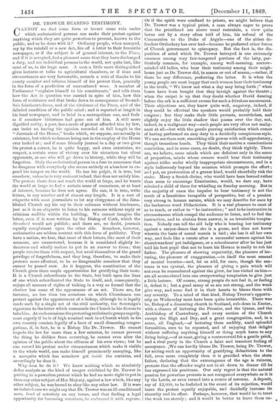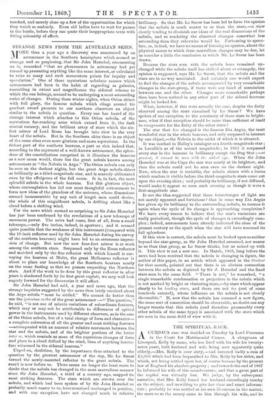DR. TROWER BEARING TESTIMONY.
CANNOT we find some form or invent some rule under which ecclesiastical persons can make their protest against anything which they are quite powerless to prevent, known to the public, and so be done with it? Ordinary people, when annoyed, say by the rainfall or a new Act, fire off a letter to their favourite newspaper, or if the subject is of general interest, to the Times, and if it is accepted, feel a pleasant sense that they have discharged a duty, and are individual persons in the world, not quite lost, like most of us, in the huge mass. A man a little more distinguished gives lectures or talks to agricultural chambers, or if time and circumstances are very favourable, seconds a vote of thanks to his county member and relieves himself of his protest then, generally in the form of a prediction of unnumbered woes. A member of Parliament "explains himself to his constituents," and tells them how the Act in question was carried in spite of him, how this form of resistance and that broke down in consequence of So-and- So's faintheartedness, and of the virulence of the Press, and of the deluded condition of the public mind ; and is reported at length in his local newspaper, and in brief in a metropolitan one, and feels as if somehow bitterness had gone out of him. A still more dignified entity, a peer, has a mode of protest afforded him by law, can insist on having his opinion recorded at full length in the "Journals of the House," books which, we suppose, are actually in existence, but which no human being not in the employ of the House ever looked at ; and if some friendly journal in a day or two gives his protest a corner, he is quite happy, and even entertains, we suspect, a certain sense of victory over his victorious but silent opponents, as one who will go down to history, while they will be forgotten. Only the ecclesiastical person in a fuss to announce that he disagrees with everybody else seems entirely at a loss how to ex- pend his temper on the world. He has his pulpit, it is true, but somehow, unless he is very eminent indeed, that does not satisfy him. The protest there does not reach the world at large, and he wants the world at large to feel a certain sense of uneasiness, or at least of interest, because he does not agree. He can, it is true, write letters, in any number and of almost any length. It is a sort of etiquette with most journalists to let any clergyman of the Esta- blished Church say his say in their columns without hindrance, just as it is an etiquette to listen to his sermons without reply or criticism audible within the building. We cannot imagine the letter, even if it were written by the Bishop of Cork, which the Standard would not publish ; and there are, no doubt, journals equally complaisant upon the other side. Somehow, however, ecclesiastics are seldom content with this form of publicity. They have a notion, we fear, that most of their letters, like most of their sermons, are unanswered, because it is considered slightly in- decorous and wholly useless to put in an answer to them ; that people receive them with respect, but avail themselves of the grand privilege of forgetfulness, and they long, therefore, to make their protests more effectual, to be so disagreeable somehow that they cannot be passed over. As it happens, the constitution of the Church gives them ample opportunities for gratifying their taste. It is a Church subordinate to the State, but built upon the lines of one which subordinated the State to itself, and, consequently, enjoys all manner of rights of talking in a way so formal that the chatter has some of the appearance of an act. There are, for instance, no less than ten occasions on which Churchmen can protest against the appointment of a bishop, although he is legally made such by a single act of the civil authority, the Sovereign's signature to the letter which commands the Church in his diocese to take him. At such occasions theprotesting ecclesiastic grasps eagerly, most eagerly if he is of high nominal rank in a Church which in his own country consists legally of a knot of small dissenting congre- gations, if, in fact, he is a Bishop like Dr. .Trower. He cannot impede the law for more than a few minutes, he cannot prevent the thing he dislikes from occurring, he cannot even alter the opinion of the public about the silliness of his own views ; but he can record his protest under circumstances which make it visible to the whole world, can make himself prominently annoying, like a mosquito which has somehow got inside the curtains, and accordingly he does it.
Why does he do it? We know nothing which so absolutely defies analysis as the kind of temper exhibited by Dr. Trower in putting in a powerless protest which he had no more right to put in than any other subject of Her Majesty, against a law which, like any other subject, he was bound to obey like any other law. If it were an isolated case we might say that Dr. Trower was an ill-conditioned man, fond of notoriety on any terms, and that finding a legal opportunity for becoming notorious, he embraced it with rapture. Or if the spirit were confined to priests, we might believe that Dr. Trower was a typical priest, a man always eager to prove that the priesthood are above usual restraints, a view quite borne out by a story often told of him, his refusal of the Communion to the Duke of Argyle—one of the ablest de- fenders Orthodoxy has ever had—because he preferred other forms of Church government to episcopacy. But the fact is, the dis- position of mind which Dr. Trower betrayed is one extremely common among very fair-tempered portions of the laity, par- ticularly common, for example, among well-meaning, narrow- minded old ladies, who bear their testimony among their neigh- bours just as Dr. Trower did, in season or out of season,—rather, if there be any difference, preferring the latter. It is when the young people are most happy that such women bear their testimony to the truth, "We know not what a day may bring forth ;" when boxes have been bought that they inveigh against the theatre ; when the carpet is up that they doubt whether David dancing before the ark is a sufficient excuse for such a frivolous amusement. Their objections are, they know quite well, nugatory, indeed, if they could be effectual the speakers would probably hold their tongues ; but they make their little protests, nevertheless, and slightly enjoy the little shadow that passes over the day, not, indeed, in a malignant way—such people are very often not malig- nant at all—but with the gentle purring satisfaction which comes of having performed an easy duty in a decidedly conspicuous style. We can see them now, smoothing silk gowns with self-approbatory, though tremulous hands. They think their motive a conscientious conviction, and in some cases, no doubt, they think rightly. There are, we believe, some minds which are deficient only in the sense of proportion, minds whose owners would bear their testimony against trifles under wholly inappropriate circumstances, and in a style ludicrously beyond the occasion which prompts the effort ; and yet, on provocation of a graver kind, would cheerfully risk the stake. Many a Scotch divine, who would have been burned rather than seem to encourage Erastianism, would, we dare say, have rebuked a child of three for whistling on Sunday morning. But in the majority of cases the impulse to bear testimony is not the result of a fanaticism incapable of perspective, but of a passion very strong in human nature, which we may describe for once by the barbarous word Didacticism. It is a real pleasure to most of us to teach, or rather to "be instructive; " and to be instructive in circumstances which compel the audience to listen, and to feel the instruction, and to abstain from answer, is an irresistible tempta- tion. Nobody can tell the old lady who is bearing her testimony against a carpet-dance that she is a goose, and does not know wherein the basis of sound morals is laid ; she has it all her own way, and feels like a curate after a successful sermon against his churchwardens' pet indulgence, or a schoolmaster after he has just told his best pupil that not to learn his Horace is really to rob his father. The pleasure of showing superiority, the pleasure of lec- turing, the pleasure of exaggeration,—in itself the most sensual of mental luxuries—and, let us add, for once, though the sen- tence is too cynical, the pleasure of giving a pain which will not even be remembered against the giver, far less visited on him— are all accumulated into one overpowering temptation to give just a little lecture. Of course, strong people do not feel it, or feeling it, defeat it ; but a good many of us are not strong, and the weak give way, and none find it in their hearts to blame them with any severity. To a mind of that kind, Bishop Trower's opportu- nity on Wednesday must have been quite irresistible. There was he, Bishop of a dissenting church in Scotland, sub-dean in Exeter, with a chance of lecturing the Premier, and the Queen, and the Archbishop of Canterbury, and every section of the Church except the High and Dry,-and a great congregation, and, in a sense, all England,—of lecturing them audibly, amid splendid formalities, sure to be reported, and of enjoying that delight without suffering anything himself or doing much harm to any living being,—of at most, giving a controversial foe a gentle priek, and a rival party in the Church a faint and transient feeling of annoyance. We can hardly blame Dr. Trower, being Dr. Trower, for seizing such an opportunity of gratifying didacticism to the full, even more completely than it is gratified when the stern father, declaring that the extravagance of the age is ruinous, protests that the offender ought not to sit down to dinner till he has expressed his penitence. Our only regret is that the natural passion for powerless protests is not recognized everywhere as it is by the Lords, or even turned into a source of revenue. A deposit, say of 22,000, to be forfeited in the event of its rejection, would leave the protest equally enjoyable, and decidedly increase its sincerity and its effect. Perhaps, however, that would be to treat the weak too sternly ; and it would be better to leave them tin- touched, and merely close up a few of the opportunities for which they watch so zealously. Even old ladies have to wait for pauses in the bustle, before they can quote their inappropriate texts with fitting solemnity of effect.







































 Previous page
Previous page